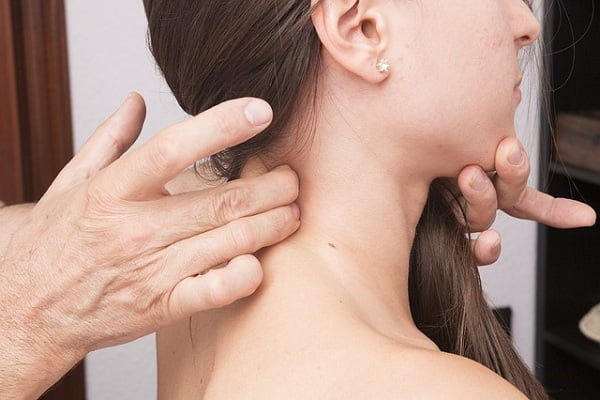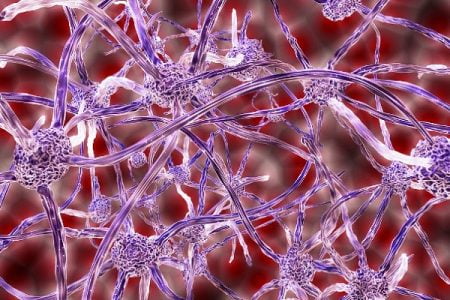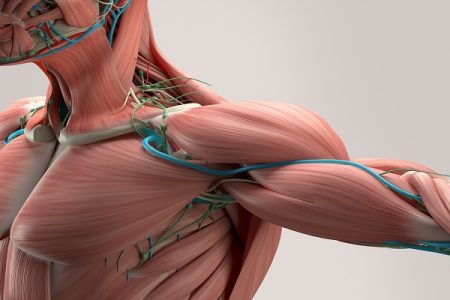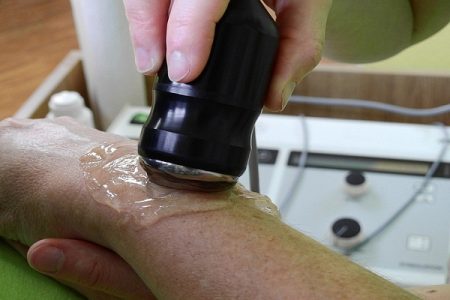Pinched Nerve in Neck: Causes, Symptoms, Treatment
- Updated on: Jul 31, 2024
- 7 min Read
- Published on Oct 3, 2019


Compressed Nerve in Neck
A compression or irritation of a nerve in your neck leads to a condition known as cervical radiculopathy. It is commonly known as pinched nerve in neck. Such a condition mainly occurs in those nerves which branch out from the spinal cord.
The most common location for a pinched nerve to occur is within the spine region. The vertebral column consists of nerve roots which innervate different parts of our body and thereby control muscle movement and different body sensations. The nerve roots which are tightly packed within the spinal canal are highly vulnerable for compression.
Pinched Nerve in Neck Symptoms
The symptoms experienced by an individual depend upon the specific nerve which is affected and its severity of compression. The most common symptoms experienced during a trapped nerve in neck include:
- You may experience pain in your neck, which is felt as a sharp and burning sensation
- The pain may radiate into your shoulders and travel into your arm, which is innervated by the damaged nerve. This may include neck, shoulder, biceps, forearm, hands, fingers and various upper body muscle groups from where the damaged nerve travels.
- You may experience severe neck pain in your pinched nerve during some neck movements such as extending, straining your neck and while turning your head.
- Tingling sensation or feeling of pins and needle in your hands and fingers
- Loss of sensation
- You may experience weakness in the muscles of your arm, shoulder or hand
By placing your hand on top of your neck, the neck nerve pain may decrease. This occurs due to temporarily relieving of the pressure on your nerve roots.
Compression of Your Cervical Spine
The cervical spine consists of seven vertebrae referred as C1 toC7. It starts at the base of your skull and run throughout your neck to your upper back region. The vertebrae contain eight pairs of nerve roots which are present between them. The nerve root pair C8 is located between the last cervical vertebra (C7) and the first thoracic vertebra (T1).
Compression of specific nerve root pairs leads to the development of specific symptoms. These may include such as:
Pinched Nerve at C5: It causes shoulder pain, deltoid weakness and a small area of your shoulder may experience numbness.
Pinched Nerve at C6. It causes weakness in your biceps and wrist extensors and you may experience pain or numbness which travels down the arm to your thumb region.
Pinched Nerve at C7. It causes pain or numbness which radiates down your arm to your middle finger.
Pinched Nerve at C8. It causes hand dysfunction and pain or numbness which travels down to the outside of your little finger and impairs its reflexes.
See also: Pinched Nerve In Back: Symptoms, Causes, Diagnosis, Treatment
Signs of Severe Nerve Damage for a Pinched Nerve in Your Neck
If you encounter extreme pressure on your neck nerve for a prolonged period of time, the pain and muscle weakness may severely increase. Such a condition results in loss of reflexes, dexterity, loss of sensations and weakness of muscles in the affected region.
If the pinched nerve in your neck is deprived of proper nutrients, it may result in loss in ability of your nerve fiber to transmit electrical impulses to your brain and can eventually lead to the death of your damaged nerve. Subsequently, if large numbers of nerve fibers loses their functions, you may feel numbness in the affected region and the muscles may not contract properly.
Pinched Nerve in Neck Causes
The most common causes that may lead to the development of a trapped nerve in your neck are degenerative changes or due to a herniated disk.
Degenerative Changes
With age, the disk in spine starts degrading and the height of your disk decreases. As a result, it begins to bulge out. They tend to lose water and become stiff. These changes lead to collapse in the disk space height and cause your overall length of the spine to shorten.
This decrease in height of the spine is compensated by formation of extra bones around your disk. These bones are referred as bone spurs and they provide strength and stiffness to your spine. The bone spurs lead to narrowing of your foramen (small opening on each side of the spinal column from where the nerve roots exits) and pinches the nerve roots.
Herniated Disk
When the jelly-like substance (nucleus) of the disk pushes itself to the annulus (outer ring), it leads to the occurrence of a herniated disk. If your disk gets worn off or injured, the nucleus completely squeezes out.
If the herniated disk oozes out from the spinal canal, it creates a pressure on your sensitive nerves and leads to an experience of pain and weakness in your nerve supply areas.
A herniated disk can occur during certain physical movements such as lifting, pulling, bending and twisting movements.
Diagnosis of Trapped Nerve in Your Neck
The primary diagnosis involves discussion of your signs of pinched nerve in neck and physical examination of the affected region. Your doctor may ask about your medical history and examine your neck, arm, shoulder and hands. He/she will look for weakness in your muscles, loss of sensation and if any changes in your reflexes have occurred.
Your doctor may also try some neck and arm movements for your affected hand, to recreate symptoms of your trapped nerve in neck.
Diagnostic Tests for trapped nerve in neck
For further internal analysis of your damaged nerve, your doctor may recommend certain digital diagnostic tests. These tests may identify the exact damaged nerve and its underlying cause. The diagnostic tests are as follows:
X-rays for detecting pinched nerve in neck
X-rays are used to study dense structures such as bones of your body. It allows to picturize the alignment of your bones along the neck. An X-rays-based analysis identifies whether the foramen has narrowed down and whether any damage has occurred to your disks.
If your pinched neck has occurred because you were injured in a car accident, your personal injury lawyer may require X-rays as proof of your injury. They can help when it comes to gaining compensation from those who were responsible for your injury.
Computed Tomography Scans (CT) for nerve compression in neck
A computed tomography scan helps your doctor to identify presence of any bone spurs in your cervical spine.
Magnetic Resonance Imaging (MRI) Scans for diagnosing pinched nerve effects in neck
Magnetic resonance imaging scans provide better images of your body’s soft tissue. It helps your doctor to identify presence of any nerve compression which is caused due to damage in your soft tissues near your neck region. An MRI determines if your spinal cord or nerve roots are damaged.
Electromyography (EMG)
Electromyography involves measurement of electrical impulses of your muscles during rest and contraction period. Your doctor may also perform nerve conduction studies along with an EMG to determine the normal functioning of your nerves.
An EMG determines presence of any pressurized spinal nerve roots and any kind of nerve damage and its cause.
Pinched Nerve in Neck Treatment
Many patients do not require any medical treatment for their trapped nerve in their neck. Their neck nerve pain may go away on its own in two or three days. But, in a few cases, treatment of their trapped nerve in neck may be required and it may take longer time to heal the compressed nerve.
As per your condition, your doctor may recommend surgical or non-surgical treatment methods to heal the pinched nerve.
Non-surgical Treatment for Pinched Nerve in Neck
The doctor primarily recommends certain non-surgical treatment methods for pinched nerve in neck relief. These treatment methods include:
Soft Cervical Collar
Soft cervical collar is a padded ring-shaped cushion, which is wrapped around the neck. It contains Velcro which holds the collar in a fixed position. This collar provides support and rest to your neck muscles and restrains the neck movement. The collar also prevents further compression of your neck nerves, which are involved in neck movement.
The American Academy of Orthopedic Surgeons advises to wear a cervical collar for only a short stretch of time, as longer duration can decrease the strength of your neck muscles.
Physical Therapy for Relieving Pain due to Nerve Compression in Neck
Physical therapy involves a set of exercises which help in reliving neck nerve pain, strengthening your neck muscles and also improving the range of neck motion.
In some cases, doctors recommend traction therapy to gently stretch your joints and muscles of your neck. It helps in opening the space around your pinched nerve and also reduces the compression in the affected region.
You can also try chiropractic care and acupuncture as a remedy for pinched nerve in neck.
Medications for neck pinched nerve treatment
If you experience severe trapped nerve in neck symptoms, your doctor may recommend some medications to provide relief and comfort. These may include such as:
Non-steroidal Anti-inflammatory Drugs (NSAIDs)
NSAIDs are pain relief medications which work against nerve irritation or inflammation. Some common NSAIDs include aspirin, ibuprofen, and naproxen.
Oral Corticosteroids
Doctors usually prescribe a short course of oral corticosteroids to reduce swelling and inflammation around the affected nerve. They provide relief from neck nerve pain.
Steroid Injections
Steroid injections are directly administered to your affected neck nerve to reduce the inflammation. Your doctor may apply the injection between the laminae (epidural injection) in the foramen (selective nerve injection) or into the facet joint.
Steroid injections do not help in relieving pressure in your affected nerve, which may be caused by a narrow foramen or by a bulging or a herniated disk. They are only effective in reducing the swelling and can also provide relief from nerve neck pain.
Narcotics
Narcotics are prescribed for those patients who suffer from severe trapped nerve neck pain and are not healed by other non-surgical treatment methods. They are prescribed for a short duration of time.
Surgical Treatment for pinched nerve in neck
After a few weeks of treatment through non-surgical methods, if your trapped nerve in neck is not cured, your doctor may suggest surgery of the compressed nerve.
A large number of surgical options are available to treat the condition of cervical radiculopathy. Your doctor may suggest a suitable surgical procedure depending upon various factors such as pinched nerve symptoms and location of the pressurized nerve located in your neck.
How long do you experience a trapped nerve in your neck?
A pinched nerve in your neck may last for a few days to a few months. The recovery time depends upon the severity of damage that has occurred in your nerve and the treatment option your doctor chooses to provide relief from the pinched nerve symptoms.











